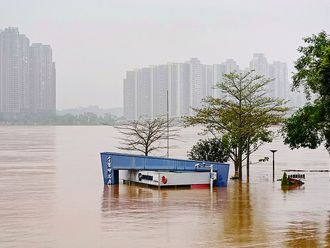Rangoon, Myanmar: Critics have said that Myanmar’s elections cannot be considered truly free because voting was not held in some areas of the country still fraught with ethnic violence. And about 1 million Rohingya Muslims, who are stateless and considered by the government to be illegal immigrants from neighbouring Bangladesh, have been stripped of their right to vote.
More than 100,000 Rohingya still reside in displacement camps after Muslim and Buddhist violence in 2012.
“We’ve said it is difficult to see how this can be a truly free and fair election given the disenfranchisement of the Rohingya population, the 25 per cent of parliament guaranteed to the military and other structural problems,” said Tom Malinowski, assistant US secretary of state for democracy, human rights and labour. “But there can still be a result that credibly reflects the overall desires of a majority of the Burmese people.”
The election is being closely watched by Myanmar’s supporters in the West, particularly in the Obama administration, which encouraged the regime’s shift toward democracy by easing sanctions and sending nearly $500 million (Dh1.84 billion) in aid.
In a statement, Secretary of State John Kerry commended the nation on a “peaceful and historic poll” in which millions voted for the first time.
“While these elections were an important step forward,” he said, “we recognise that they were far from perfect. There remain important structural and systemic impediments to the realisation of full democratic and civilian government, including the reservation of a large number of unelected seats for the military; the disenfranchisement of groups of people who voted in previous elections, including the Rohingya; and the disqualification of candidates based on arbitrary application of citizenship and residency requirements.”
Officials have expressed concern that Myanmar’s reforms could be stalling, and dismay over a series of tough new laws governing family size, religious conversion and interfaith marriage, seen as targeting the country’s Muslim minority.
More than 30 million voters were eligible to cast ballots for the upper and lower houses of parliament, as well as state and regional assemblies.
The country’s new computerised voter-registration rolls have been widely criticised for repeating and skipping names, but the Carter Centre said in a report on October 27 that many specific claims of errors appeared to be “unsubstantiated.”
Outside Rangoon, the busy streets give way to flat farmland, dotted with simple huts with woven bamboo walls, mango groves and palm trees. Residents there — among the 70 per cent of the population who still eke out a living in agriculture — said they were more concerned about their livelihoods of river fishing and farming than politics, and that their local candidates had never come to see them. One village received electricity only four months ago.
Nevertheless, on Sunday there were lines to get into the polling station in a school compound — men in one building, women in the other. Banners on the wall demonstrated voting procedures in graphics for those who had never voted before. A poll worker told the women that if they needed to go home to cook for their families, they could come back later before polls closed at 4pm.
Latt Latt Win, 34, clutched her 1-year-old daughter and said she had risen at 6am at her bean farm and travelled by boat, then precarious motorbike, to reach her polling place. She had been spurred to make the two-hour journey by all the media coverage, she said, and she thought it was her responsibility.
“I wanted to vote,” she said. “I got up, said my morning prayer and came here.” But she had still not made up her mind about her vote.
Sein Kyaw Thee, 45, who makes about $15 a day as a fisherman, said he voted for Aung San Suu Kyi’s party because he hoped it would bring prosperity to Burma and because he reveres her.
“The party is like the parents of the public,” he said. “But it’s not because of the party, it’s because of Mother Suu.”












